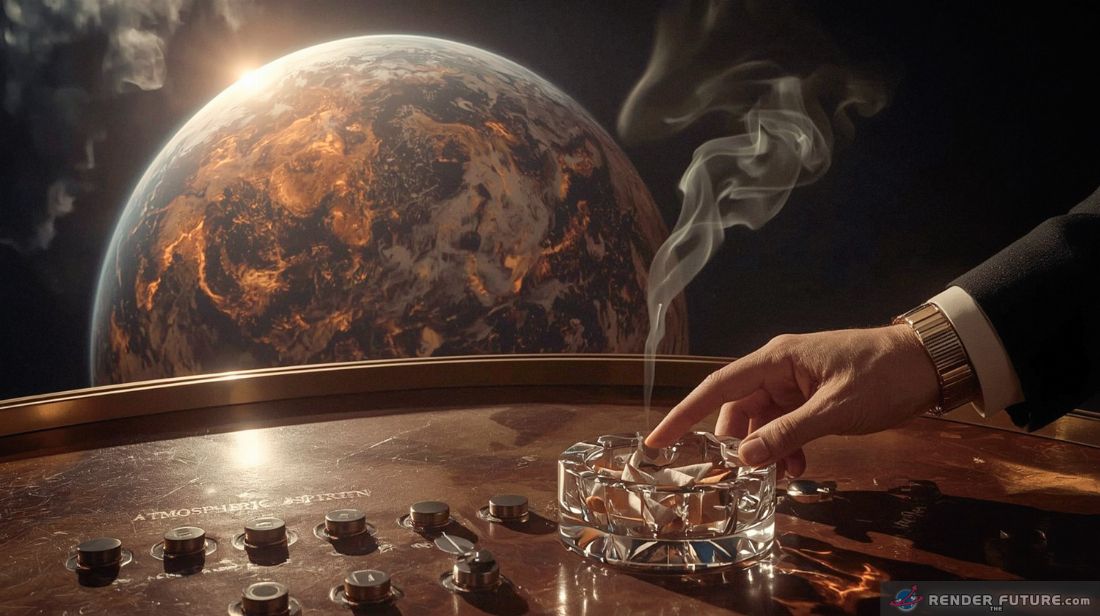Scientists Plan to Dim the Sun to Cool Earth
The Climate Emergency Button
The UK is launching outdoor geoengineering experiments – including spraying reflective particles into the atmosphere – in a controversial £50m bid to temporarily cool the planet.
Think of it as a giant planetary sunshade that could buy time against climate collapse. But here’s the catch: no one knows if this “fix” might break something worse.
Why This Terrifies & Fascinates:
- Could slow Arctic melting within years (not decades)
- Might disrupt monsoons millions rely on for food
- Sets a dangerous precedent – who controls Earth’s thermostat?
- Becomes addictive – stopping could cause “termination shock” heating
The Ultimate Climate Dilemma:
Is this a necessary emergency brake… or a distraction from real emission cuts? Even scientists are divided, with some calling it “treating cancer with aspirin.”
Your vote:
☀️ Like if we should explore all options
⚠️ Comment: Is geoengineering genius or madness?

The Ultimate Climate Hack – Or Hubris?
The UK is about to turn science fiction into reality by spraying particles into the atmosphere to dim the sun. On paper, it sounds brilliant – a quick fix to buy time against climate disaster. But here’s the fact: we’re essentially performing open-heart surgery on the planet without a full medical degree. What if we disrupt monsoons that feed billions? Or trigger “termination shock” if we stop? The scariest part? Once we start, we might not be able to quit.
Let’s be honest – we’re the generation that screwed up the planet, and now we’re trying to cheat-code our way out of the consequences. Spraying particles into the stratosphere isn’t just science – it’s humanity’s ultimate power move, like a toddler who broke their toys now demanding superglue.
The terrifying part? We might actually pull it off… only to discover we’ve been playing Jenga with Earth’s climate system all along. One wrong move and the whole tower comes crashing down – but with global temperatures as our high score, can we really afford not to try?
Who Gets to Control Earth’s Thermostat?
Geoengineering isn’t just a scientific challenge – it’s a geopolitical nightmare. If the UK (or any nation) perfects this tech, who decides when and where to deploy it? A heatwave in Europe? A drought in Africa? The power to tweak global temperatures could become the ultimate weapon – or the ultimate inequality amplifier.
Just think of a world where rich countries cool themselves while the global south suffers unintended consequences. Sound far-fetched? It’s already being debated in backroom policy meetings.
The “Cancer With Aspirin” Argument
Critics call solar geoengineering a “dangerous distraction” from real climate action – like slapping a Band-Aid on a bullet wound. And they’re not wrong. If we lean on this as a crutch, fossil fuel giants will happily keep polluting while we play atmospheric alchemist. But what if we need both? With tipping points looming, maybe we do need emergency brakes – but only if we’re also slamming the pedal on emissions cuts. Can humanity handle that kind of responsibility?
Here’s the uncomfortable truth: geoengineering isn’t a solution – it’s a symptom of our failure to address the root disease. We’re like a chain-smoker demanding a better oxygen mask instead of quitting cigarettes. The fossil fuel industry must be laughing all the way to the bank as we pour millions into atmospheric bandaids while they keep pumping emissions. The irony? This “aspirin” might work just well enough to let politicians and corporations keep their addiction to business-as-usual – until the planet’s fever spikes beyond any quick fix.
Are we buying time, or just constructing a more elaborate denial?
The Unavoidable Experiment
Like it or not, we’re already geoengineering the planet – just recklessly, by pumping CO2 into the air. The UK’s experiments are about doing it deliberately, with data and safeguards. But let’s not kid ourselves: this isn’t just science. It’s a societal gamble. If it works, it could save millions. If it backfires, we’ll wish we’d never touched the dial.
Humanity has been conducting an unplanned, planet-scale geoengineering experiment since the 18th century through cumulative greenhouse gas emissions. The Industrial Revolution initiated what climate scientists now recognize as the Anthropocene epoch – a period where human activity became the dominant influence on Earth’s climate systems. Over two centuries of fossil fuel combustion has increased atmospheric CO2 concentrations from 280 ppm to over 420 ppm, altering Earth’s energy balance through radiative forcing.
This unintentional climate modification has yielded measurable consequences: a 1.1°C global temperature increase, ocean acidification (pH decrease of 0.1), and intensification of the hydrological cycle. Now, facing climate tipping points, researchers propose deliberate solar radiation management (SRM) as a potential mitigation strategy. Unlike our previous uncontrolled experiment, these approaches would employ:
- Stratospheric aerosol injection (SAI)
- Marine cloud brightening
- Cirrus cloud thinning
The scientific community remains divided on SRM’s efficacy and risks. Proponents cite climate model projections showing potential to reduce peak temperatures, while opponents highlight risks of:
- Precipitation pattern disruption
- Ozone depletion
- Moral hazard delaying decarbonization
This represents a fundamental shift from unconscious planetary alteration to intentional climate intervention – a transition requiring unprecedented scientific rigor, international cooperation, and ethical oversight. The challenge lies in developing governance frameworks that prevent unilateral action while allowing necessary research to assess SRM’s risk-benefit ratio.
Final Thought: Should We Even Be Doing This?
Geoengineering forces us to confront an ugly truth: we’ve failed at prevention, so now we’re scrambling for a cure. Whether this is genius or madness depends on one thing – will we use it as a last resort, or as an excuse to keep burning fossil fuels?
The answer will define the next century.

References and Sources:
- Nature Climate Change: “The Risks and Rewards of Solar Geoengineering” (2025)
- Advanced Research and Invention Agency (Aria): UK Geoengineering Programme Briefing









